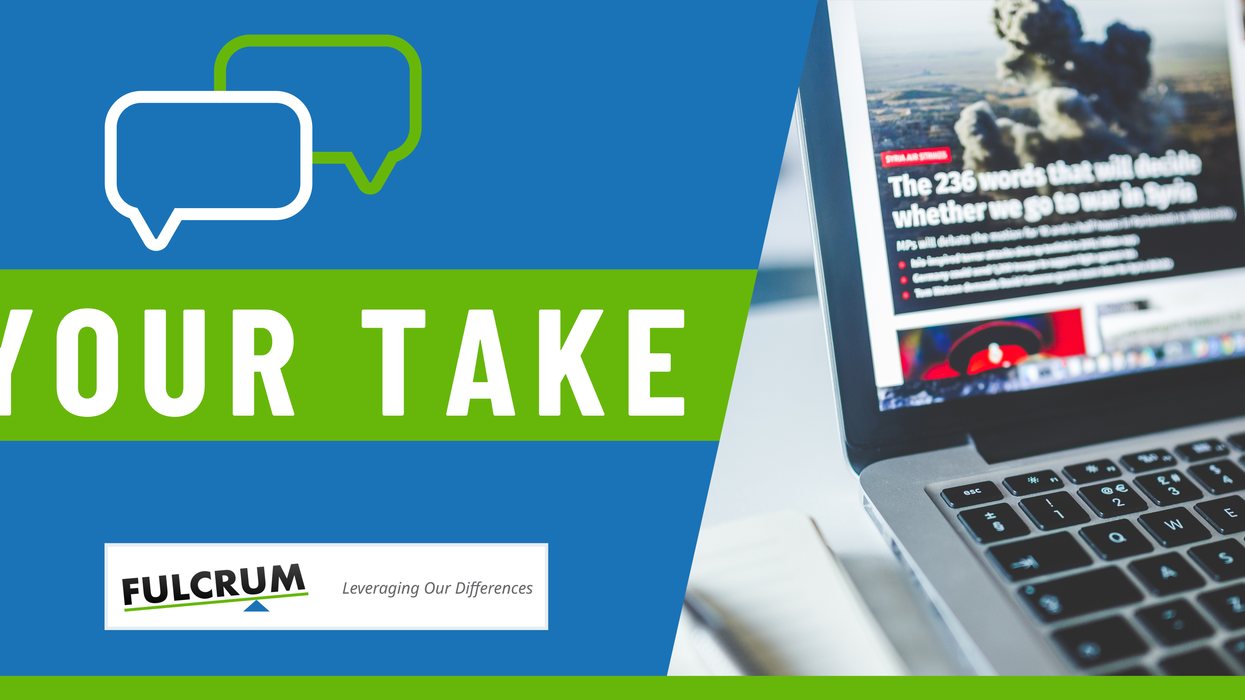We asked our readers for their take on this complex question earlier in the week:
Should journalistic objectivity be the standard in reporting?
Not surprisingly there was unanimity amongst all of the respondents as to the essential role a free press plays in our society. Also, not surprisingly the question — which speaks to truth, bias and objectivity — evoked varying viewpoints and, at times, deep emotions.
Just the answers related to objectivity showed the layers of complexity. One respondent, Daniel Brafman, eloquently stated: “Objectivity is the illusion of an unexamined mind, and facts are simply data points. The idea that there can be an ‘objective’ journalism is like saying ‘we can navigate life without judgment.’”
As you review some of the answers below you’ll get a sense of why we asked the question. A free and vibrant press is of vital importance to the survival of our democracy, yet it means different things to different people.
We are hopeful you will find reflecting on this fundamental component of a healthy democracy is a worthwhile venture, even if we haven’t come up with the answer.
In 1896 Adolph Ochs said this after taking over as publisher of The New York Times:
“It will be my earnest aim that The New York Times gives the news, all the news, in concise and attractive form, in language that is parliamentary in good society, and give it as early, if not earlier, than it can be learned through any other reliable medium; to give the news impartially, without fear or favor, regardless of party, sect, or interests involved; to make of the columns of The New York Times a forum for the consideration of all questions of public importance, and to that end to invite intelligent discussion from all shades of opinion.”
In this age of social media and instant communication, is an idealistic mission like the above even realistic? Add to this the questions about fact, opinion, truth and integrity and you’ll see why we struck a chord with our readers on this vital issue.
Thank you as always for your input. Responses have been edited for length and grammatical errors.
Selected responses:
No, it shouldn't. Editorials should be clearly marked as such, but opinion will always exist, however small, in reporting. Therefore, it is unrealistic to expect journalists to stay objective in their reporting, so long as the consumer knows that every article has bias. -Bobby Hamblin
This is a paraphrase of a recent NEWS article in my local newspaper: "The senate blocked funding of this critical project." The author of that article would insist that the sentence is entirely objective as presented. He is unable to recognize that the word "critical" renders the sentence opinion, not fact. The lower house of the state legislature and governor's office is controlled by one party, the Senate is controlled by the other party. The author, apparently, favors the party controlling the lower house and executive because he deemed the project as critical, without attributing the adjective to the project's backers. He never even noticed that the addition of the word "critical" destroyed his objectivity and credibility. If the ethics of journalism has changed so much that paying lip service to objectivity is no longer necessary or ethical, perhaps it is time for news outlets to openly indicate that, so unsuspecting consumers don't assume that a project is objectively critical, when a large portion of the body politic does not agree. -Francis White
I would say to stick to the "who," "what" and "where" of what journalists see or hear, as much as possible while staying as neutral as possible. Subconscious biases will probably still be present … I suspect. Hopefully, adhering to professional journalism standards can help to mitigate them nonetheless, as much as consciously aware to do so. -Cheryl Underhill
It's hard to see the difference between being objective and focusing on finding the truth. Seems like the purpose of the former is precisely the latter. If by "finding the truth" we mean adding the journalist's interpretation, there's nothing wrong with that so long as it is clearly identified as such. -Paul Lillebo
Should journalistic objectivity be the standard in reporting? Yes! But journalistic objectivity has never existed. To begin with, journalists and/or their producers choose the stories to cover. And the stories they cover even if they are simply reporting occurrences without opinion illustrate subjectivity. As an example, figure out all of the violent crimes in any given city. Then watch the local news. Do the protagonists of said violent crimes on the 6:00 news reflect either the totality or proportionality of those in reality? It does not. Issue after issue, that are fact-based and not subject to opinion, are reported as if they are subject to opinion. Journalism should not set policy. As a country we can say efficiency and humanity in health care be damned, we still want a for-profit system. But we should do so knowing the facts that are not subject to opinion but math or discernable reality. If we did this issue after issue, people would have trust in the media. As it is now, the mainstream media are just appendages of the American plutocracy invested in an indoctrinated population. After all, rules don’t need to apply if we are exceptional. -Egberto Willies
Yes, journalists should strive to use journalistic objectivity in reporting. If this was the standard, perhaps the public would be less likely to be riled up into polarized frenzies with each competing news story that has been boosted to create excitement to increase viewership, and thus ad revenue. While it is true that objectivity is almost impossible to attain, striving to share information objectively, rather than tied to emotional identity politics, seems the better option for maintaining a peaceful society. -Betty Nordengren
As a former print journalist and editor, I find that many people often confuse journalism with advocacy. Journalists do look for the truth of a matter, as best it can be determined, through the objective practices and processes of the craft. The true journalists I knew, and those I respect today (such as staff at AP and Reuters) gathered and presented facts, context plus relevant, different and significant points of view from others. The purpose is to provide sufficient people for a rational person to create an informed and well-grounded opinion. -Daniel Smith
The Society of Professional Journalists Code of Ethics begins with the goal to “seek truth and report it.” I believe this principle should be the north star for any working journalist. The conversation about objectivity unnecessarily muddies the water and allows for the spread of misinformation and antidemocratic ideas under the guise of balance or neutrality. We’ve seen this play out as non-issues like election integrity are continually framed as debates or open questions despite no evidence of fraud or truth to the claims that votes were manipulated. Trying to be objective at the expense of the truth does not serve reporters or their audiences. The sooner we can remove objectivity from the discussion about journalism, the better our democracy will be. -Jenna Spinelle
If Politician A says, for instance, that State X is threatening Country N, journalists should report those statements. They should also try to discern from other sources if the statements are true. What facts does the politician cite in her statement? Can those facts actually be verified? Is there independent evidence to corroborate or refute the stated facts? A lot of what is reported, it seems to me, are not facts but transcriptions of Side C says this and Side W says that, with no attempt at all to verify the truth. That isn’t journalistic objectivity. If someone repeats a lie, how many times should the media report that lie, even labeled, before they conclude that nothing useful is to be gained by repeatedly saying, “Politician S told this lie again”? Do we want to know how often lies are repeated, or do we want to know what the truth is. And who gets to decide? -Kathleen Finderson
Facts don’t take sides. Rarely do they all point to one “yes” or “no.” But for journalism to survive, it has to be trustworthy. Those who only want their biases reinforced can find so-called “news” outlets that provide only what they want to hear: my side good, your side bad, no gray, just black and white. It makes our job ever so much more important. -Barney Lerten (a reporter in Oregon)
I wholeheartedly support any effort that will transform our current trauma-TV and opinion-laden media to a more objective reporting of facts — minus what’s become inevitable opinionated sensationalism, clickbaiting news. -Charlotte Beyer
I think that journalistic objectivity is a fiction. Even if all the information a journalist publishes can be verified by several sources, the very things the journalist chooses to cover — as well as what they ignore — are a bias unto themselves. Further, history is chock full of examples of things accepted as facts by many, if not all, people that were later proven false. Not to mention that "multiple sources" can simply be several members of an echo chamber. Trying to publish "the truth" is just as biased as attempting journalistic integrity. I prefer journalists who admit their own biases openly, so I can at least make judgments about how much I trust what they have to report after that. - Mike Pierson
My take is that journalism should absolutely focus on truth-telling, because democracy can’t survive without truthful information. Democracy depends on citizens and policy makers being able to make informed, reality-based decisions. That’s why autocratic politicians, whether abroad or at home, lie all the time. They want people to despair of ever knowing what’s really true — and come to trust the autocratic leader as the only source of truth. I would frame the problem with journalism, however, not in terms of its “objectivity” focus, but its “neutrality” focus. Seeking objectivity implies that there is an “object,” reality, which is knowable by careful reporting. It means taking a truth-telling perspective, even if those truths are uncomfortable and offend some people. “Neutrality,” on the other hand, literally means “neither one, nor the other,” so you have to distance yourself from either side. The neutrality focus of political journalism especially leads to the temptation to find two sides to every story, creating false equivalencies. It forces a kind of symmetry on every situation—even when the situation is asymmetrical. As many journalism critics have noted, a symmetrical description of an asymmetrical reality is an active distortion of the truth. We see the consequences of this in how the public ends up being misinformed. More people today incorrectly believe that unemployment is worse now than a year ago. How much of this is due to journalism focusing on maintaining neutrality rather than telling the truth? How much of it is due to the savvy approach of political journalism that portrays every issue like a game between two equivalent sides, as the journalist floats neutrally above — even when our democracy hangs in the balance? How much of this problem also pertains to the civil dialogue movement, especially if we adopt a similar free-floating neutrality even in the face of the rising antidemocratic forces of autocracy in our own country? -Jeff Prudhomme (who inspired this question)




















